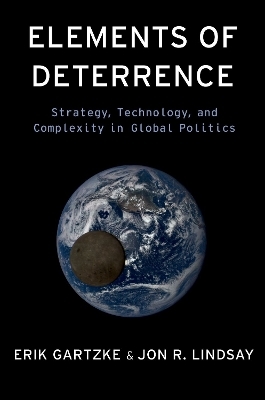
Elements of Deterrence
Oxford University Press Inc (Verlag)
978-0-19-775445-0 (ISBN)
If war is the continuation of politics by other means, then the diversity of technologies in modern war suggests a diversity of political effects. Some military forces or postures are most useful for "winning" various kinds of wars. Others are effective for "warning" adversaries of consequences or demonstrating resolve. Still others may accomplish these goals at lower political cost, or with greater strategic stability. Deterrence is not a simple strategy, therefore, but a complex relationship between many ends and many means.
This book presents findings from a decade-long research program on "cross-domain deterrence." Through a series of theoretical and empirical studies, we explore fundamental trade-offs that have always been implicit in practice but have yet to be synthesized into a general theory of deterrence. Gartzke and Lindsay integrate newly revised and updated versions of published work alongside new work into a holistic framework for understanding how deterrence works--or fails to work--in multiple domains. Their findings show that in deterrence, all good things do not go together.
Erik Gartzke is Professor of Political Science and the Director of the Center for Peace and Security Studies (cPASS) at the University of California, San Diego. Jon R. Lindsay is Associate Professor at the School of Cybersecurity and Privacy and the Sam Nunn School of International Affairs at the Georgia Institute of Technology.
Biographies
Acknowledgements
List of Figures and Tables
Ch. 1 Introduction: Revisiting Deterrence Theory
I The Means and Ends of Deterrence
Ch. 2 What is Deterrence?
Ch. 3 Deterrence is Not (Just) One Thing
Ch. 4 Politics by (Many) Other Means
II Theoretical Problems in the Cyber Domain
Ch. 5 Cyberspace is Unsuitable for the Strategy of War
Ch. 6 Cyberspace is Ideal for the Strategy of Deception
Ch. 7 Cyber Deception Versus Nuclear Deterrence
III Empirical Evidence in Multiple Domains
Ch. 8 Land: Presence and Credibility
with Koji Kagotani
Ch. 9 Sea: Maneuver and Uncertainty
Ch. 10 Air: Automation and Cost
with James Walsh
Ch. 11 Space: Intelligence and Stability
with Bryan Early
IV Strategic Implications of Complexity
Ch. 12 Trade: Asymmetry and Multipolarity
with Oliver Westerwinter
Ch. 13 Cyber: Complements and Substitutes
with Nadiya Kostyuk
Ch. 14 Gray Zone: Ambiguity and Escalation
with J. Andres Gannon and Peter Schram
Ch. 15 Conclusion: Summary and Implications
Bibliography
| Erscheinungsdatum | 25.04.2024 |
|---|---|
| Verlagsort | New York |
| Sprache | englisch |
| Maße | 157 x 236 mm |
| Gewicht | 553 g |
| Themenwelt | Sozialwissenschaften ► Politik / Verwaltung ► Europäische / Internationale Politik |
| Sozialwissenschaften ► Politik / Verwaltung ► Staat / Verwaltung | |
| ISBN-10 | 0-19-775445-7 / 0197754457 |
| ISBN-13 | 978-0-19-775445-0 / 9780197754450 |
| Zustand | Neuware |
| Haben Sie eine Frage zum Produkt? |
aus dem Bereich


